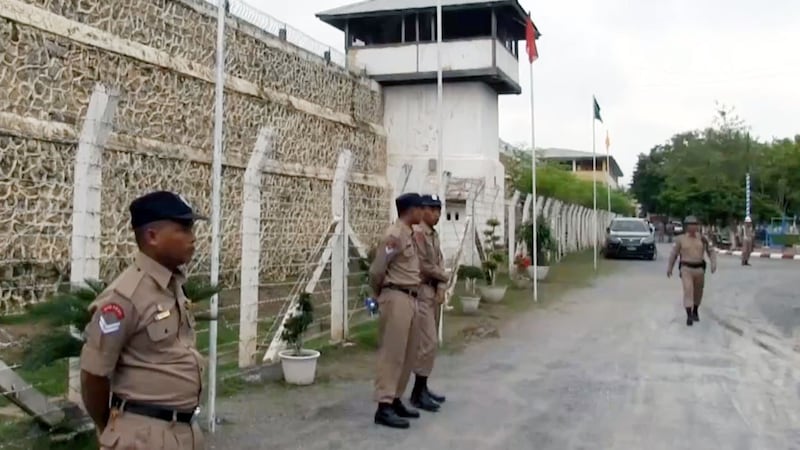Inmates in Myanmar’s Obo Prison are routinely tortured and beaten to the point of requiring hospitalization, family members of current and former inmates told Radio Free Asia. Some have been subjected to solitary confinement in leg cuffs for more than two years.
The accounts show that such abuse persists at the prison in the central Mandalay region, where RFA reported about a year ago that guards had beaten and injured more than 80 inmates, most of whom were political prisoners.
Such mistreatment is typical of prisoners opposed to the military junta, or former enemy combatants, which took over the country in a February 2021 coup, sources inside the country say.
On Jan. 8, Khaing Myae Thu, a member of the Kachin Independence Army, an armed ethnic group in the country’s north, was admitted to an intensive care unit in the prison after he was beaten by prison staff and other inmates for several hours, his family told RFA Burmese.
They said they learned of his beatings through secret communications via sources close to the prison.

When prisoners arrive at Obo Prison, they are regularly beaten to the point of needing hospitalization in the prison clinic, which are poorly supplied and staffed, according to a family member of a political prisoner who wished to remain anonymous for fear of reprisal.
“Their family members are never informed so that they do not suffer grief over this torture,” he said. “The prisoners, however, told us about it. The prison’s disciplinary officials, staff members and senior prisoners carried out the torture.”
‘Blood splattered’
A political prisoner who was recently released from Obo Prison in early this month said that he witnessed his peers being tortured in the prison.
“The most serious excruciating torture happened on Sept. 9, 2022, in which all political prisoners were beaten,” he said. “Blood splattered all over the floor. Many prisoners suffered broken hands, or had their teeth knocked out as they were severely beaten.”
He said that he worries about the health of prisoners as there is not enough medicine at Obo prison and its hospital.
Seven other political prisoners, Aung Myin Wai, Myo Myanmar, Thura, Myo Zarchi, Myo Myat Htike, Kyaw Ye Aung and Pili, were also taken to the hospital after they were tortured by being held in solitary confinement in leg cuffs for more than two years.
Letters of complaint
A family member of a political prisoner at Obo called for effective legal action against those responsible for illegal attacks on prisoners.
“Complaint letters were sent to senior officials about torturing prisoners, but authorities did not take effective action against those responsible in these cases,” he said. “They have committed such inhumane acts. And for that we are making a call for legal action.”
Aung Myo Min, the human rights minister for the shadow National Unity Government, which consists of former lawmakers who were ousted in the 2021 coup, told RFA that he has received a complaint letter and will try to take effective legal action against the offenders in each case.
Thike Tun Oo, a former prisoner of Obo Prison, told RFA that prison authorities commit human rights violations, and always try to hide them.
“I myself am a former political prisoner. I know that authorities of Obo Prison commit human rights violations, and they try to hide such cases,” he said. “They can keep such cases secret to a certain degree. Prison staff members watch discussions between the prisoners and their lawyers.”
An official of the Thailand-based Assistance Association for Political Prisoners, or AAPP, said that the junta’s Ministry of Home Affairs would not handle the complaints of torture registered by inmates’ family members.
“The military council has allowed such torture, and we can be sure that no action will come out from the authorities,” he said.
RFA attempted to contact Naing Win Ko, the spokesperson of the Prison Department, to discuss these cases, but he could not be reached.
Political Prisoners Network–Myanmar released a report on December 31 2023, saying that 34 political prisoners died in prisons in 2023. Among them, 18 inmates were killed in prison, and the remaining 16 died when they did not receive proper medical treatment.
Nearly 20,000 people are being held in prisons across the country as of Jan. 16, 2024, AAPP said.
Translated by Aung Naing. Edited by Eugene Whong and Malcolm Foster.
